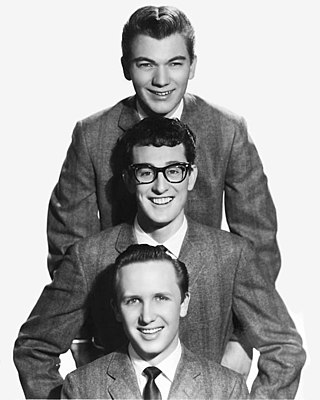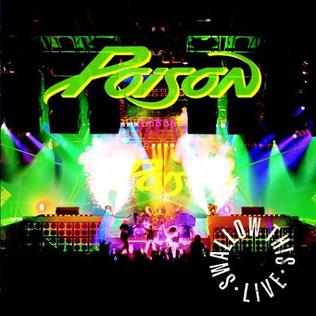
The Crickets were an American rock and roll band from Lubbock, Texas, formed by singer-songwriter Buddy Holly in January 1957. Their first hit record, "That'll Be the Day", released in May 1957, peaked at number three on the Billboard Top 100 chart on September 16, 1957. The sleeve of their first album, The "Chirping" Crickets, shows the band line-up at the time: Holly on lead vocals and lead guitar, Niki Sullivan on rhythm guitar, Jerry Allison on drums, and Joe B. Mauldin on bass. The Crickets helped set the template for subsequent rock bands, such as the Beatles, with their guitar-bass-drums line-up, performing their own self-written material. After Holly's death in 1959 the band continued to tour and record into the 1960s and beyond with other band members through to the 21st century.

Steel Wheels is the 19th British studio album by the English rock band the Rolling Stones, released on 25 August 1989 in the US and on 11 September in the UK. It was the final album of new material that the band would record for Columbia Records.

Swallow This Live is the first live album by American glam metal band Poison. It was released in 1991 by Capitol Records. The album peaked at number 51 on the Billboard 200, number 42 on the Cash Box albums chart, and was certified Gold in 2001 by the RIAA.
Danny Ray Whitten was an American guitarist and songwriter, best known for his work with Neil Young's backing band Crazy Horse, and for the song "I Don't Want to Talk About It", a hit for Rod Stewart and Everything but the Girl.

Dirty Work is the 18th British and 20th American studio album by the English rock band the Rolling Stones. It was released on 24 March 1986 on the Rolling Stones label by CBS Records, their first under their new contract with Columbia Records. Produced by Steve Lillywhite, the album was recorded during a period when relations between Mick Jagger and Keith Richards had soured considerably, according to Richards' autobiography Life.

"Harlem Shuffle" is an R&B song written and originally recorded by the duo Bob & Earl in 1963. In 1986, it was covered by the British rock band The Rolling Stones on their album Dirty Work.
Giuffria was an American rock band from Washington, D.C., formed in 1981 by Gregg Giuffria after his departure from the band Angel.

David Glen Eisley is an American musician, singer, songwriter, and actor.

Flowers is the second compilation album by the Rolling Stones, released in June 1967. The group recorded the songs at various studios dating back to 1965. Three of the songs had never been released: "My Girl", "Ride On, Baby" and "Sittin' on a Fence", the first of which was recorded in May 1965 during the sessions for "(I Can't Get No) Satisfaction," and the other two of which were recorded in December 1965 during the first lot of Aftermath sessions. The rest of the album tracks either appeared as singles or had been omitted from the American versions of Aftermath and Between the Buttons.

Through the Past, Darkly is the second compilation album by the English rock band the Rolling Stones, released in September 1969 by Decca Records in the UK and London Records/ABKCO Records in the US.

Primitive Cool is the second solo album by English singer Mick Jagger and was released in 1987. As the follow-up to Jagger's 1985 album She's the Boss, Primitive Cool was another attempt by Jagger to make him a solo star.

Earl Slick is an American guitarist best known for his collaborations with David Bowie, John Lennon, Yoko Ono and Robert Smith. He has also worked with other artists including John Waite, Tim Curry and David Coverdale, in addition to releasing several solo recordings, and two records with Phantom, Rocker & Slick, the band he formed with Slim Jim Phantom & Lee Rocker.

WWII is a duet album by Waylon Jennings and Willie Nelson, released on RCA Victor in 1982.
Dirty White Boy was a short-lived American hard rock/glam metal band formed in Los Angeles in 1988. The band released an album called Bad Reputation in 1990, and toured the U.S. and Europe to support it before breaking up due to poor album sales.
"It's All Over Now" is a song written by Bobby Womack and his sister-in-law Shirley Womack. It was first released by The Valentinos, featuring Bobby Womack, in 1964. The Rolling Stones heard it on its release and quickly recorded a cover version, which became their first number-one hit in the United Kingdom, in July 1964.

Silk + Steel was the second album released by American rock band Giuffria in 1986. It was produced by Pat Glasser, who was at the time also the producer of Giuffria's MCA labelmates Night Ranger. The band covered "I Must Be Dreaming", a Willy DeVille song that went to No. 52 on the Billboard Hot 100. The record's peak position on The Billboard 200 was No. 60 on June 21, 1986.

"One Hit (To the Body)" is the opening track to the English rock band the Rolling Stones' 1986 album Dirty Work. The first Rolling Stones single to feature a Ron Wood co-writing credit with Jagger and Richards, it charted in the U.S., Netherlands and Australia. Reaching number 80 in the UK, it was their poorest charting single at the time.

Sahara is the second studio album by the American rock band House of Lords, released on August 21, 1990.

Demons Down is the third studio album by House of Lords, released on April 7, 1992.

"Dirty White Boy" is a song recorded by British-American rock band Foreigner, written by Lou Gramm and Mick Jones, and produced by Roy Thomas Baker, Jones, and Ian McDonald. It was the first single taken from the band's third studio album, Head Games (1979). The B-side, "Rev on the Red Line" has also proven to be very popular among fans, but was never released as an A-side. Lou Gramm's trademark scream at the end of the song is missing from this abbreviated version of "Dirty White Boy". The song spent nine weeks in the Top 40.















